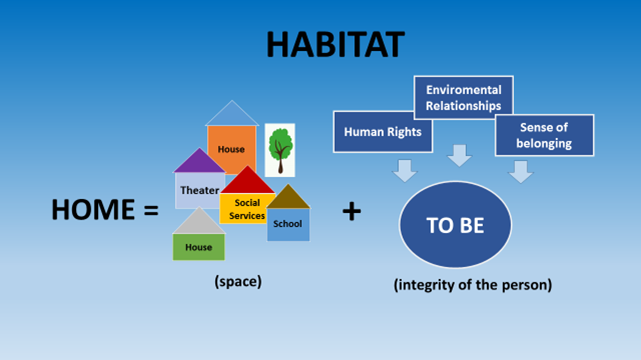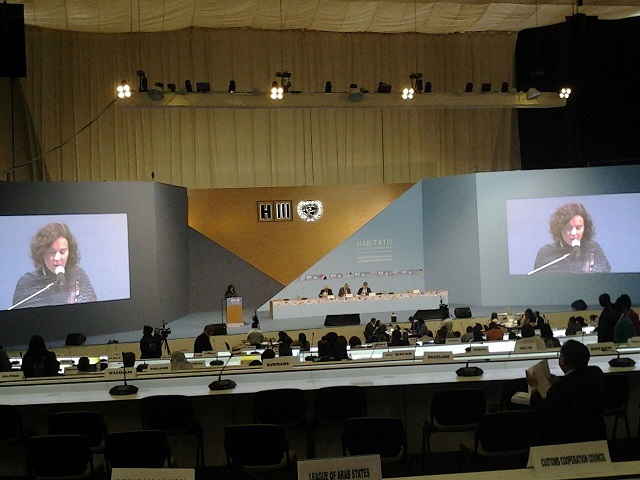For the first time, Caritas Internationalis is participating in the Habitat III process
Sonia Olea Ferreras, Commissioned by Caritas Internationalis for Habitat III
Over the past year, during the preparation process for Habitat III, we have encountered the same analyses and proposals made by civil society organisations in relation to cities and human rights.We have seen this in Geneva,with the United Nations Special Rapporteur on Adequate Housing; in Barcelona, at Habitat 3's themed Symposium on Public Spaces; in New York, in conjunction with Techo.org, Caritas USA and the Permanent Mission of Ecuador to the UN, and especially, in forums in Quito. These analyses and proposals include:
- The human race thinks, designs, modifies, transforms and builds without considering the people and towns at the centre and without any consideration of human rights (in this case primarily but not limited to, the Human Right to adequate, dignified housing). This is true both in structural terms, and in terms of the design and implementation processes.
- Citizen participation will always be needed. There are many good design practices, but there is also a whole host of complications when it comes to transparency in management and the follow-up of proposals, costs, etc..
- Conflict resolution between citizens and government is, in the vast majority of cases, left to the courts. There is little take up of alternatives such as mediation in which all players have the same status, meaning that pathways to consensus and implementation have to be found.
- Co-ordination of public policy between all actors in taking a holistic view of human rights, as well as effective government intervention, especially at local level, when these rights are breached.
The difficulty of implementation
Housing plans have always been purely economic and have not considered human rights. In practice this has meant that housing is planned as a financial investment and the public policies related to it are intented to sustain the housing market (land for building, etc.),to facilitate consumption (tax and tax-related benefits) and to prevent loss of housing (debt repayment solutions, etc.).
To this, we can add that rights are often looked at with too narrow a perspective. In other words, when we believe that we are working with human rights in mind, we focus exclusively on access to buildings (housing) rather than, as the PIDSEC's General Observations indicate, the interdependence of rights. This involves seeing different rights as having equal status, and that a systemic, holistic approach is the basis for any change as far as personal dignity and the citizen are concerned.
Our proposal

On the New Urban Agenda
It is also important to look at advances, which have been very significant compared with Habitat II twenty years ago: inclusion of the human right to housing and the right to the city. Nevertheless, the process, needs to be much more interactive with regards to proposals.
For Caritas Internationalis the main problem is not having citizens at the centre of the Agenda. The city is merely a stage on which we must be able to live with as much dignity and happiness as possible: a common home, as Pope Francis tells us.
We are concerned about how we view criminalisation of poverty in public spaces and discussed this at Habitat III symposia and assemblies (also little reflected in the NUA). Criminalisation is absolutely unheard of in the field of town planning. Public spaces are places for gatherings, Agoras, rather than spaces for consumption and security checks on this consumption. There is a multitude of regulations, which proliferate around the world, with fines for and detention of people who are vulnerable and socially excluded.
If we did not believe in the political tools of International Law on Human Rights, the work and the contribution which so many people and corporate bodies make to achieving it, would have no meaning. For example, the Millennium Development Goals, their connection to Habitat III (Objective no. 11) and Universal Periodic Examinations of Human Rights undertaken by leaders every four years require people to believe in their usefulness to be effective.
It is clear, especially to me as a lawyer, that a treaty/convention on each of the Human Rights in the 1948 Declaration, binding and declaring each Right as subjective and enforceable, would be a dream realised. However, anything political also gives cause to demanding, implementing and following up public policies, and the budgets which need them, to bring about international agreements such as the NUA. In each inherent action, be it local, regional, state, European... we can propose the minimum demands agreed by the international community at the New York General Assembly which proposed the Quito Declaration. Although that is not the case yet, because there is still some way to go, until it can be used in court if we can question and have an impact on the policies of a Government, or a Confederation of States and the UN themselves, we will have achieved something.
Follow-up work at all levels lies ahead of us,and if we do not do it as a network with other entities, other countries and territories with different perspectives to our own, it will be very difficult to produce a Habitat IV with the Human Right to housing as a guide.
References:
http://habitat3.org/wp-content/uploads/press_files/HGxpErYh7AEX4brcbO.pdf
http://www.caritas.org/2016/10/caritas-defends-a-common-home-where-everyone-can-live-decently/
http://www.caritas.org/includes/pdf/advocacy/Habitat3PositionEN.pdf





